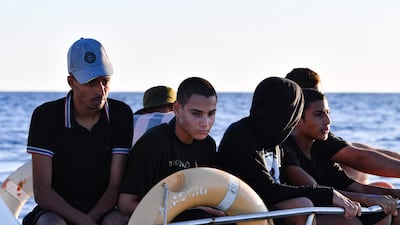Tunisia “must deliver” on a deal with the EU to tackle migrant boats, the head of the largest party in the European Parliament has said.
Manfred Weber, chief of the European Parliament’s People’s Party caucus, arrived in Tunis on Tuesday for a two-day visit and met President Kais Saied to discuss the strategic partnership.
“My message was clear: we need results,” Mr Weber told Politico of his remarks to Mr Saied.
In July, the EU and Tunisia signed a comprehensive agreement, which outlined pillars for co-operation, including economic assistance, aimed in part at ending the migration crisis in the Mediterranean.
Hundreds of millions of dollars' worth of development aid would also help the Tunisian economy, under a deal announced by European Commission President Ursula von der Leyen in July.
As part of the deal, the EU promised to give Tunisia €105 million ($114 million) to boost its border protection forces as part of a €900 million financial assistance package. But it is contingent on Tunisia succeeding in making far-reaching economic reforms, including those suggested by the International Monetary Fund.
€150 million in immediate assistance was also granted to help Tunisia’s struggling state budget, the EU chief said during her visit in July.
Mr Weber’s visit came amid a debate within the European Parliament regarding the stipulations of the agreement and the amount of money disbursed.

“We are talking about a lot of European taxpayers’ money here, and the figures have to come down. I can’t explain to the European taxpayer that we are spending so much tax money here if we don’t get clear results.”
Mr Weber said a results-orientated approach on migration is what his caucus was aiming to achieve through his visit.
However, many believe that the stipulations of the agreement and what the Europeans are asking for are unbalanced and might not actually be a win-win situation for both parties.
“Most economic aid coming from the global north serves the interest of the global north,” Fadhel Kaboub, a professor of economics at Denison University in Ohio, told The National.
“Economic aid is not some sort of charity, it’s part of foreign policy, it’s part of influence and all countries use it unfortunately.”
Mr Kaboub, who is president of the Global Institute for Sustainable Prosperity, said he believed the deal was not new, but rather repackaged as part of Europe's border control system.
“At the end of the day Tunisia is going to participate in controlling borders. Is the EU trying to solve this problem? Why are people leaving Sudan, Burkina Faso, from Mali?” he said.
“No, they are not concerned about that, they are concerned about how they could ensure they could not cross the Mediterranean, the way they do it is to give Tunis millions of euros to police the borders.”
Humanitarian crisis
In the past few years, more and more migrants from Tunisia and sub-Saharan Africa, who chose Tunisia as a transit route, have opted to take the dangerous Mediterranean journey to Europe.
Many people perish en route, including women and children. Others make it to Europe but most of them are now kept in detention centres, pending their deportation or being granted asylum.
However, with increasing restrictions and border control, most of these migrants find themselves in a grim state of limbo as they do not know their fate after finally making it to Europe.
The EU started relying on Tunisia, providing its maritime national guard with high-end equipment and specialised training as part of their strategy to deter more migrants from arriving in Europe.

Meanwhile, Mr Saied stressed once again the need to adopt a common approach to address the issue of irregular migration.
“Eliminating the causes [of irregular migration] rather than addressing the results is more important,” Mr Saied told Mr Weber during their meeting at the Carthage Presidential Palace.
“We must confront criminal networks that traffic in human beings in the north and south of the Mediterranean,” he added.
Rights groups have criticised Mr Saied’s migration rhetoric, especially after his statement in February in which he claimed there was a plan “to alter Tunisia’s demographic structure” through “the settlement of migrants”, a reference to the so-called Great Replacement Theory favoured by elements of the far right in Europe and the US.
As a result, a witch-hunt campaign started targeting black people in the country, including Tunisians and sub-Saharan migrants, which led even more people to attempt to cross the Mediterranean.
Following Mrs Von der Leyen's visit and also that an earlier trip by Italian Prime Minister Giorgia Meloni, in addition to an anti-migrant campaign in the southern city of Sfax, Tunisian authorities began a massive expulsion operation of black migrants to the desert.
The area on the border with Algeria and Libya to which they were sent has been described as “no-man's-land”.
Many of those sent there died, while others were lucky enough to be rescued by the Libyan National Guards and the Red Crescent.


